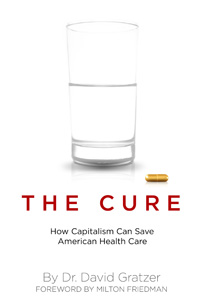 Source of book image: http://www.encounterbooks.com/books/cure/
Source of book image: http://www.encounterbooks.com/books/cure/
Milton Friedman is gone now, but the new book reviewed below, includes a forward written by him. Friedman can be praised for many reasons; a minor one is that he was tireless and generous in offering praise and support for others who were seeking to better understand free markets.
About 10 years ago, I broke my leg playing basketball. After I came out of surgery, with a cast stretching from my ankle to the top of my leg, an orderly asked me whether I had ever used crutches before. I hadn’t, so he showed me what to do, swinging through them from one end of the room to the other. The whole lesson lasted about 90 seconds. When I got my hospital bill, I saw that I had been charged $150 for "gait training on crutches." I did what all insured Americans do: I forwarded the bill to my insurance company. Why should I care? I wasn’t paying for it.
One of the problems with American health care, as David Gratzer notes in "The Cure," is precisely a payment system that takes the patient out of the equation. In the early 1960s, the average American paid out of pocket one of every two dollars that he spent on health care; today the figure is one dollar in seven. The inevitable effect is hugely wasteful spending (and inflated hospital bills like mine). In fact, per-patient costs have gone up almost exactly in inverse proportion to the share of spending borne by the consumer.
Dr. Gratzer cites a remarkable Rand Corp. study that tracked health-care spending by 2,000 families over eight years. The families who got free health care spent 40% more than the families with cost-sharing arrangements. And yet the health outcomes for the two groups were the same. The lesson: Market-based health insurance systems, such as health savings accounts, cut out inefficiencies and lower costs without compromising quality.
. . .
. . . : America is clearly at a crossroads in medical care. Within the next decade we will get either some version of Hillary-care or more free-market medicine, starting with universally available health savings accounts. Let’s hope that our nation’s policy makers read "The Cure" before they decide. They will learn that the government route flattens costs only by holding back the pace of technology, artificially controlling its price and rationing its use. That is not a prescription for better health.
For the full review, see:
The reference to the book under review, is:
Dr. David Gratzer. The Cure: How Capitalism Can Save American Health Care. Encounter Books, 2006. (233 pages, $25.94)
